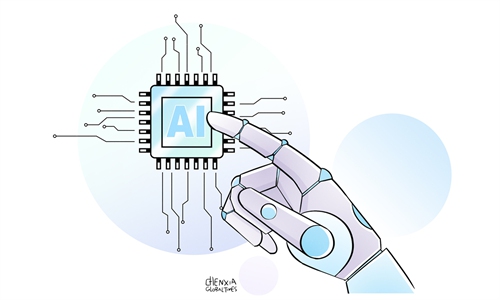
AI Photo:VCG
As San Francisco-based OpenAI just unveiled on Friday its Voice Engine tool, which can replicate people's voices, in small commodity hub Yiwu, East China's Zhejiang Province, people adopted a similar domestic artificial intelligence (AI) application to help engage with foreign traders in 36 different languages as early as in October 2023.
Voice Engine, a model for creating custom voices, uses text input and a single 15-second audio sample to generate natural-sounding speech that closely resembles that of the original speaker, said the company in a statement released on Friday.
It also outlined application scenarios from some early cases, such as providing reading assistance, translating content, reaching global communities by improving essential service delivery in remote settings and helping patients recover their voices.
Notably, when used for translation, the inserted text does not necessarily need to be in the user's native language. For example, English speakers can have their voice copied into Spanish, French, Chinese, or other languages.
In a recent case, business owners in small commodity hub Yiwu adopted a domestic Chinagoods AI Smart Service Platform to work as digital human anchors for product marketing or sales demos.
"We use Chinagoods for video translation and it can generate speech into multiple languages and reach global clients from all over the world," Yiwu toy seller Sun Lijuan told the Global Times on Sunday.
According to Sun, such AI technology has revolutionized the way she conducts business, facilitating communication with customers and saving costs.
With the development of generative AI, digital avatars began to appear frequently in short videos, customer service and other fields, and livestreaming for sales is a scenario that cannot be ignored, experts said.
In addition to AI translation, Yiwu also provides other AI functionalities, such as AI-generated online livestreaming hosts known as "digital humans," who are capable of 24/7 online livestreaming at a significantly lower cost than real human hosts.
China's market is rich and diverse in terms of the application of digital avatars. The application scenarios of digital human technology in China are diverse, from livestreaming sales and education to marketing, Wang Peng, an associate research fellow at the Beijing Academy of Social Sciences, told the Global Times on Sunday.
China is in a leading position in the field of digital human technology applications, Luan Qing, general manager of digital entertainment and culture business at SenseTime's digital world group, said in a recent interview with the Global Times.
"Compared with its international counterparts, the development of China's livestreaming and short-video industry has driven the rapid development of digital human technology, leading to an earlier and more explosive growth of digital avatar applications compared with overseas markets."
Many enterprises and factories are achieving profitability with the help of digital human anchors, driving a large number of new job opportunities in the industry chain, and virtual technology is feeding back into the real economy, Wang said.
As of December 2023, there were at least 2,805 companies in Beijing engaged in digital human-related businesses. Among them, 217 had digital humans as their core business, with total revenue of 5.1 billion yuan ($706 million) in 2023, media outlets reported.



